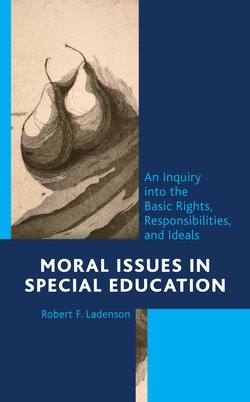Читать книгу Moral Issues in Special Education - Robert F. Ladenson - Страница 7
На сайте Литреса книга снята с продажи.
ОглавлениеPreface
This book identifies and analyzes important yet insufficiently explored basic moral questions concerning K–12 special education. It represents my best efforts to think through carefully and thoroughly questions I have pondered and, in some cases, struggled with, for many years.
Special education in American K–12 public schools is shaped largely in terms of both its organization and implementation by the Individuals with Disabilities Education Act (IDEA), which is a federal statute enacted in 1975. Intense disputes have been ongoing since the IDEA was enacted that concern matters such as decisions about the content of educational programs for diverse particular children with disabilities, educational methods to address different kinds of educational disabilities, and resource allocations for K–12 special education.
My primary aim in this book is to help readers gain clearer and deeper moral understanding of these disputes. The chapters focus upon different issues, elucidating why difficulties in resolving them are not solely a consequence of their factual or legal complexity. To the contrary the issues also implicate in essential ways moral questions that call for interpretive reflection and judgment about the application of concepts such as happiness and unhappiness, fairness, human dignity, and freedom.
My book aims to achieve a successful combination of experience and theory. The experience comes from twenty years during which I was a special education due process hearing officer. I heard and decided cases in this position involving disputes between parents of children with disabilities and K–12 public school districts under federal and state special education laws. Each of the basic moral questions I consider in this book figured importantly in one or more of the most significant among the cases I was called upon to adjudicate.
The theory comes from the forty-three years I taught and did academic writing in the subjects of moral, political, legal, and educational philosophy as a professor of philosophy. Throughout the book I draw upon major writings, both contemporary and historical, in moral, political, legal, and educational philosophy as conceptual resources. I consider such writings invaluable for framing morally crucial questions about an issue, especially when one experiences discomfort caused by a sense that the issue may be morally problematic, and yet finds it hard to articulate the crux of the problem.
Moral understanding of controversial issues, about which disputing parties all have strong convictions and feelings, does not consist in awareness of the “morally correct” way to think about the issues. It requires instead the following two kinds of understanding. First, it calls for clear articulation of the reasons that one believes morally justify one’s own viewpoint.
Second, it involves understanding from the inside viewpoints different from one’s own. Such includes not only awareness of arguments advanced to support the contrary viewpoints but also understanding of why some morally conscientious and thoughtful individuals find the arguments persuasive, which in turn entails appreciating their force, at least to some extent.
Greater moral understanding in regard to intensely disputed issues in American K–12 special education could help disputing parties apprehend each other’s positions more clearly (e.g., key arguments the other side presents and fundamental concerns motivating the arguments). As a corollary it also could help disputing parties understand better their own positions—both their strongest and their less than strongest arguments, from a moral standpoint, and the core moral considerations implicit in the strongest arguments.
Throughout this book I have tried to write in language that readers unfamiliar with the terminology and discourse style of academic philosophy can understand, and always to make it apparent why and how particular philosophical points bear upon basic moral questions in American K–12 special education. I have not attempted coverage of every controversy in American K–12 special education with significant moral dimensions. My aim instead is to help readers gain a heightened awareness of the relevance, depth, and complexities of basic moral issues that underlie the most important and longest standing of these controversies.
Throughout this book I have often stated or implied my own conclusions or viewpoints. In every such instance, however, my objective has been to open or to further discussion rather than to close it. I hope that sharing the results of these efforts with thoughtful readers will further moral understanding in regard to the ongoing intensely disputed issues in American K–12 special education.
